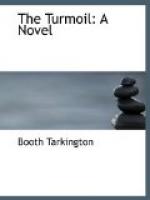“Indeed, indeed? What does it say?”
“What I want to hear.”
“Well, well!” The doctor stretched himself and stamped his foot repeatedly. “Better come along and take a drive with me. You can take the time off that he allowed for the examination, and—”
“Not at all,” said Bibbs. “I’m going to stand by my old zinc-eater till five o’clock. I tell you I like it!”
“Then I suppose that’s the end of your wanting to write.”
“I don’t know about that,” Bibbs said, thoughtfully; “but the zinc-eater doesn’t interfere with my thinking, at least. It’s better than being in business; I’m sure of that. I don’t want anything to change. I’d be content to lead just the life I’m leading now to the end of my days.”
“You do beat the devil!” exclaimed Gurney. “Your father’s right when he tells me you’re a mystery. Perhaps the Almighty knew what He was doing when He made you, but it takes a lot of faith to believe it! Well, I’m off. Go on back to your murdering old machine.” He climbed into his car, which he operated himself, but he refrained from setting it immediately in motion. “Well, I rubbed it in on the old man that you had warned him not to slide his hand along too far, and that he got hurt because he didn’t pay attention to your warning, and because he was trying to show you how to do something you were already doing a great deal better than he could. You tell him I’ll be around to look at it and change the dressing to-morrow morning. Good-by.”
But when he paid the promised visit, the next morning, he did more than change the dressing upon the damaged hand. The injury was severe of its kind, and Gurney spent a long time over it, though Sheridan was rebellious and scornful, being brought to a degree of tractability only by means of horrible threats and talk of amputation. However, he appeared at the dinner-table with his hand supported in a sling, which he seemed to regard as an indignity, while the natural inquiries upon the subject evidently struck him as deliberate insults. Mrs. Sheridan, having been unable to contain her solicitude several times during the day, and having been checked each time in a manner that blanched her cheek, hastened to warn Roscoe and Sibyl, upon their arrival at five, to omit any reference to the injury and to avoid even looking at the sling if they possibly could.
The Sheridans dined on Sundays at five. Sibyl had taken pains not to arrive either before or after the hand was precisely on the hour; and the members of the family were all seated at the table within two minutes after she and Roscoe had entered the house.
It was a glum gathering, overhung with portents. The air seemed charged, awaiting any tiny ignition to explode; and Mrs. Sheridan’s expression, as she sat with her eyes fixed almost continually upon her husband, was that of a person engaged in prayer. Edith was pale and intent. Roscoe looked ill; Sibyl looked ill; and Sheridan looked both ill and explosive. Bibbs had more color than any of these, and there was a strange brightness, like a light, upon his face. It was curious to see anything so happy in the tense gloom of that household.




